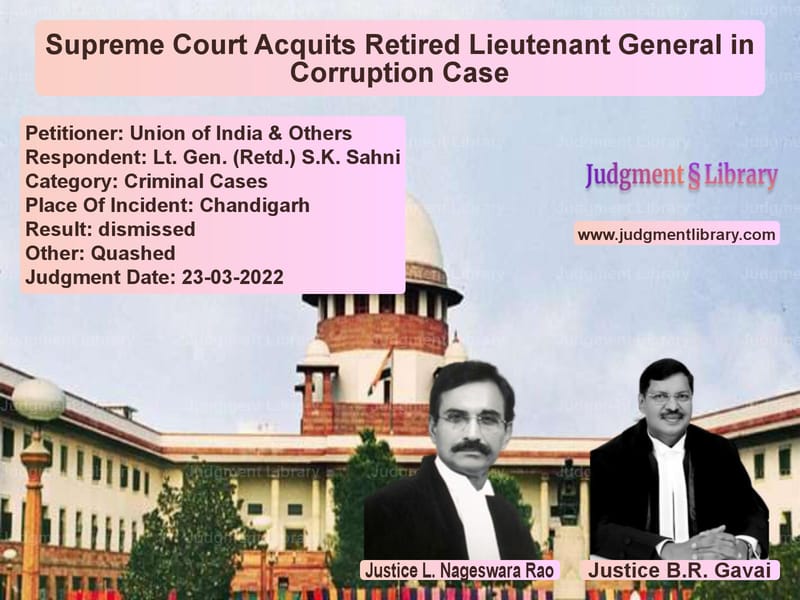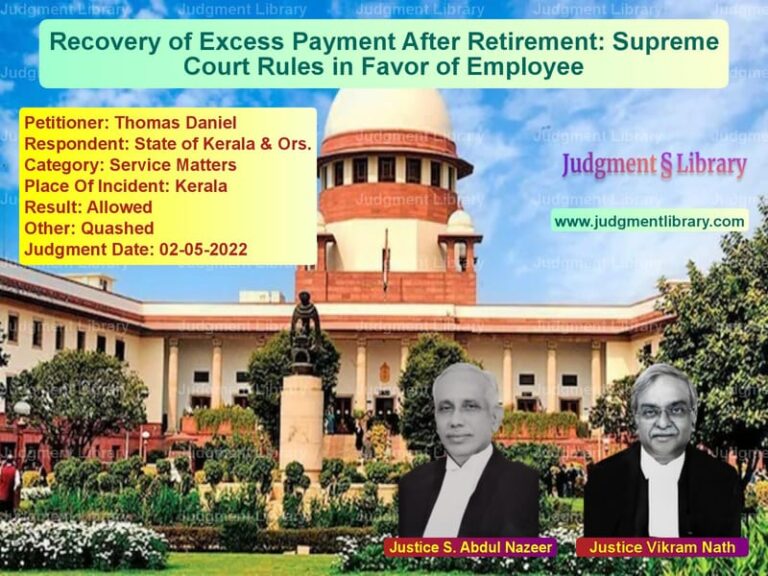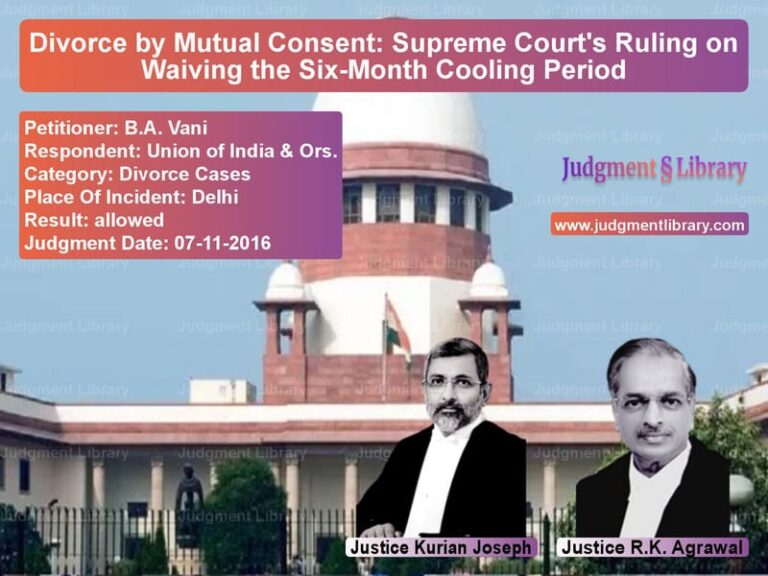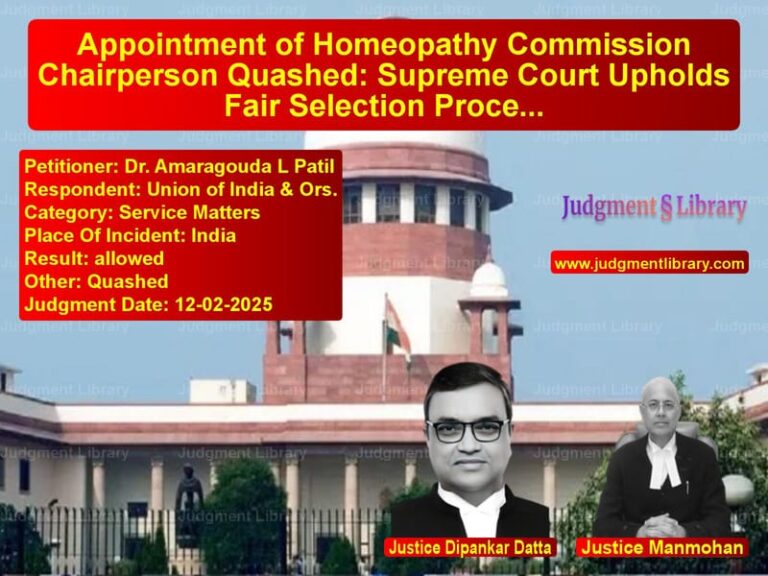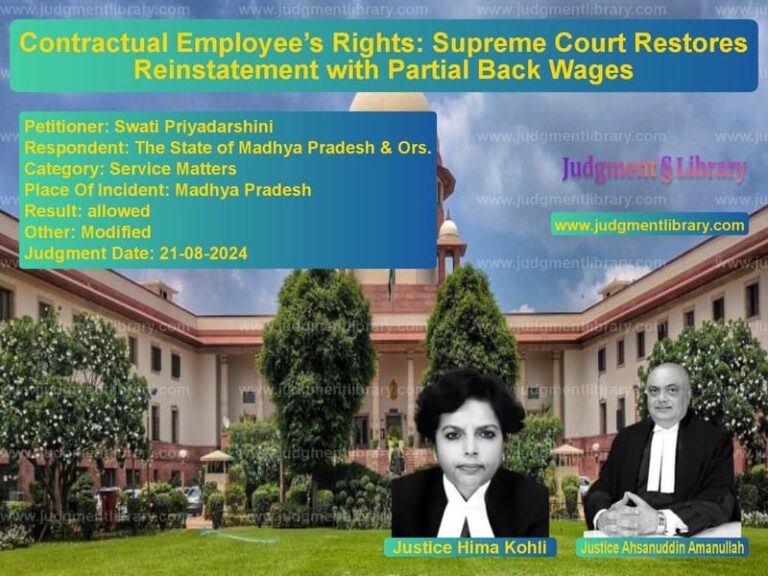Supreme Court Acquits Retired Lieutenant General in Corruption Case
The case of Union of India & Others vs. Lt. Gen. (Retd.) S.K. Sahni is a landmark ruling concerning allegations of corruption and misconduct in military procurement. The Supreme Court’s judgment acquitted the retired officer, highlighting procedural lapses and insufficient evidence to support the charges of financial impropriety.
This appeal was filed by the Union of India, challenging the decision of the Armed Forces Tribunal (AFT), which had modified the original punishment of three years’ rigorous imprisonment and cashiering to mere dismissal from service. The Supreme Court, however, overturned the AFT’s decision and fully acquitted Lt. Gen. Sahni.
Background of the Case
The dispute arose from allegations that Lt. Gen. (Retd.) S.K. Sahni, who served as Director General of Supplies and Transport (DGST), was involved in irregularities in procurement and tendering processes for rations and supplies in the Indian Army.
Following an anonymous complaint received on April 4, 2005, the army initiated an internal inquiry, which later led to a General Court Martial (GCM). The charges included:
- Misuse of authority in procurement contracts.
- Irregularities in the purchase of rations, including substandard supplies.
- Granting undue favors to suppliers.
On February 18, 2011, the GCM found Lt. Gen. Sahni guilty on multiple counts and sentenced him to:
- Three years of rigorous imprisonment.
- Cashiering from the Army (removal with loss of rank and benefits).
However, upon appeal, the Armed Forces Tribunal (AFT) modified the punishment to dismissal from service, removing the imprisonment.
Arguments Presented by the Petitioner (Union of India)
The government argued:
- The findings of the GCM were justified based on the evidence.
- The AFT overstepped its authority by modifying the punishment.
- The irregularities in ration procurement compromised the welfare of soldiers.
- There was sufficient proof that the accused’s decisions benefited select contractors.
Arguments Presented by the Respondent (Lt. Gen. S.K. Sahni)
Lt. Gen. Sahni contended:
- There was no direct evidence linking him to financial gains.
- The inquiry process was flawed and violated Army rules.
- The procurement decisions were taken collectively, and he was unfairly singled out.
- The tribunal’s findings showed inconsistencies in the prosecution’s case.
Supreme Court’s Observations and Verdict
The Supreme Court analyzed whether the prosecution had proven misconduct beyond a reasonable doubt. The Court made the following key observations:
- The inquiry process did not adhere to proper procedural safeguards under Rule 180 of the Army Rules.
- The evidence presented was circumstantial and failed to directly link Lt. Gen. Sahni to financial misconduct.
- The prosecution relied heavily on procedural lapses rather than concrete proof of corruption.
- The AFT’s decision to modify the punishment suggested that the charges were not fully substantiated.
- The benefit of doubt must be given to the accused in a criminal trial.
Based on these findings, the Supreme Court ruled:
- The appeal was dismissed.
- Lt. Gen. Sahni was acquitted of all charges.
- The order of the GCM and the AFT were quashed.
- The respondent was entitled to pensionary and consequential benefits.
- The arrears of benefits were to be computed and paid within three months.
Legal Precedents Considered
The Supreme Court referred to multiple judgments on procedural fairness and burden of proof:
- Union of India vs. Charanjit S. Gill (2000): Established that courts must ensure procedural fairness in military trials.
- Ex. Lt. Gen. Avadhesh Prakash vs. Union of India (2019): Held that military trials must meet the standards of criminal jurisprudence.
- Bachhittar Singh vs. State of Punjab (1963): Clarified that internal administrative communications cannot substitute for legal evidence.
Impact of the Judgment
This ruling has significant implications for military justice and disciplinary proceedings:
- It reinforces the principle that allegations must be proven beyond reasonable doubt.
- It ensures that high-ranking officers are not unfairly penalized without proper evidence.
- It highlights the importance of procedural safeguards in military trials.
- It sets a precedent that errors in administrative processes should not automatically lead to severe punishments.
By acquitting Lt. Gen. Sahni, the Supreme Court has reaffirmed that disciplinary actions must be supported by concrete evidence and that procedural fairness is essential in military justice.
Petitioner Name: Union of India & Others.Respondent Name: Lt. Gen. (Retd.) S.K. Sahni.Judgment By: Justice L. Nageswara Rao, Justice B.R. Gavai.Place Of Incident: Chandigarh.Judgment Date: 23-03-2022.
Don’t miss out on the full details! Download the complete judgment in PDF format below and gain valuable insights instantly!
Download Judgment: union-of-india-&-oth-vs-lt.-gen.-(retd.)-s.k-supreme-court-of-india-judgment-dated-23-03-2022.pdf
Directly Download Judgment: Directly download this Judgment
See all petitions in Fraud and Forgery
See all petitions in Disciplinary Proceedings
See all petitions in Judgment by L. Nageswara Rao
See all petitions in Judgment by B R Gavai
See all petitions in dismissed
See all petitions in Quashed
See all petitions in supreme court of India judgments March 2022
See all petitions in 2022 judgments
See all posts in Criminal Cases Category
See all allowed petitions in Criminal Cases Category
See all Dismissed petitions in Criminal Cases Category
See all partially allowed petitions in Criminal Cases Category

